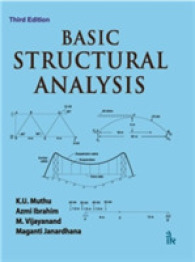Full Description
This book focuses on transnationalism as a key concept to evaluate how Europe experiences, perceives and responds to current cross-border security challenges from a legal and political perspective.
The chapters in this volume specifically provide state-of-the-art accounts on several legal and political developments that have recently taken place in relation to transnational issues, such as terrorism, irregular migration and human rights violations. It specifically discusses how Europe experiences, perceives and responds to security challenges with the expectation to identify those facets of transnationalism that would 'equally' concern political scientists and legal scholars, especially those working on subjects pertaining to the EU governance. Through a timely analysis of the specificities of these cases, the book contributes to a much wider debate on whether and to what extent the changes and practices identified are still in accordance with cornerstones of the EU governance project, such as fundamental freedoms, democracy and the rule of law. Overall, the book provides a fresh reading on the current status of security across Europe and the way it is understood and practiced from a multidisciplinary perspective
With a revised introduction and a new conclusion, this edited volume this is the ideal companion for students, researchers and practitioners interested in law, public policy and administration, and security. This book was originally published in the Journal of Contemporary European Studies.
Contents
Introduction: Security in Transnational Spaces: Legal and Political Questions in Europe 1. Bordering power Europe? The mobility-bordering nexus in and by the European Union 2. Counter-terrorism and the repression of Islamic activism: Hizb ut-Tahrir in Britain and Denmark 3. Actors and Sites for Knowledge Production on Radicalisation in Europe and Beyond 4. EU global human rights sanctions regime: is the genie out of the bottle? 5. Europol and cybercrime: Europol's sharing decryption platform 6. OK Google: is (s)he guilty? 7. The perceived rationale, variegated institutional take and impact of the EU's human rights policy in Armenia and Georgia 8. Who sets the agenda? The influence of the European Commission and the European Council in shaping the EU's response to the European sovereign debt crisis Conclusion—Security in Transnational Spaces: Legal and Political Questions in Europe








